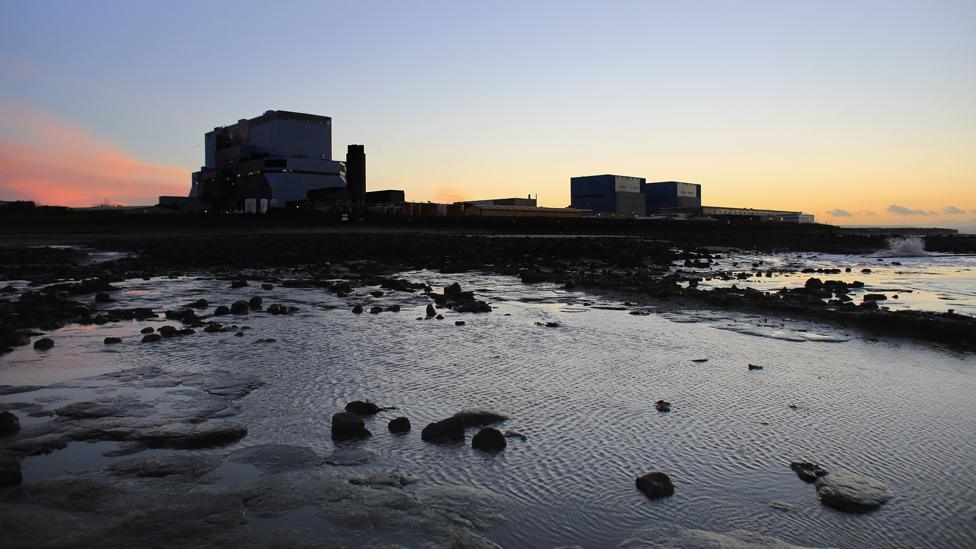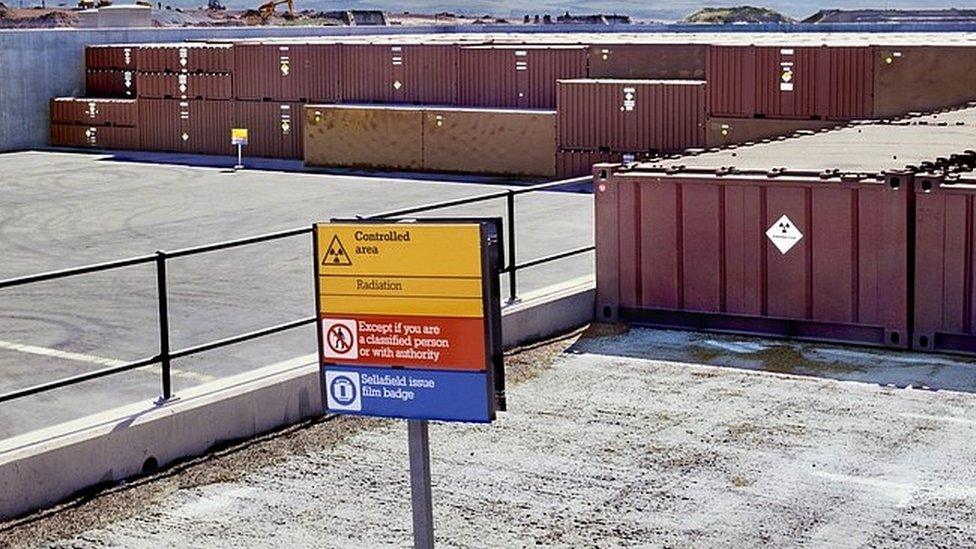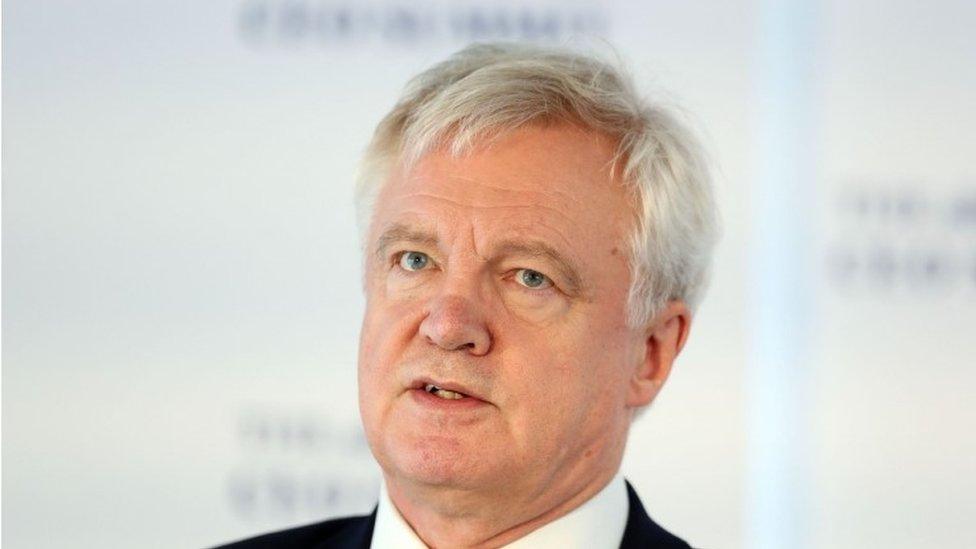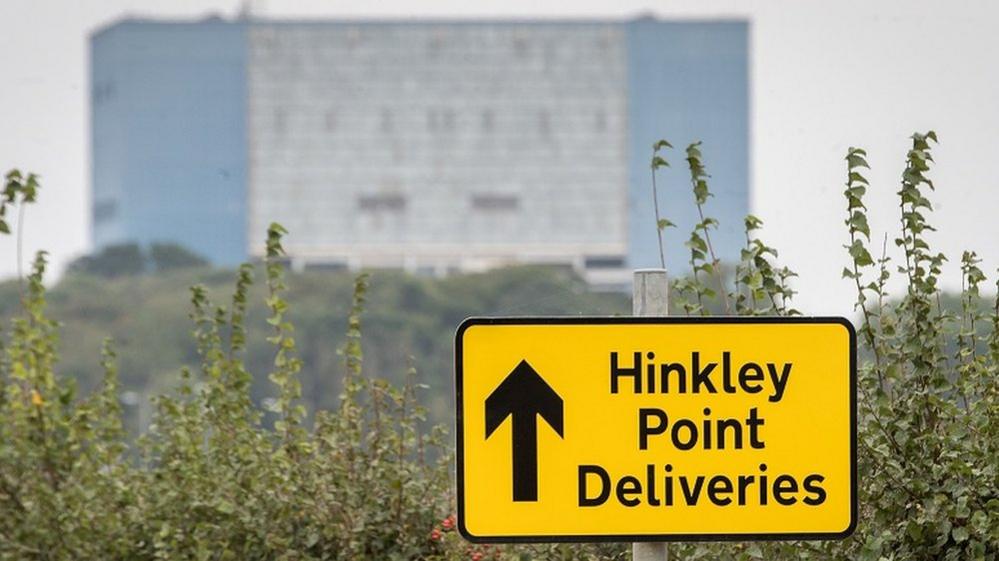Brexit: UK could be 'associate' of EU nuclear body
- Published

Hinkley Point in Somerset is to be the site of a new nuclear power station
The UK could have an "association agreement" with the EU to replace its membership of Europe's nuclear agency, Brexit Secretary David Davis has suggested.
Mr Davis told the BBC an "arbitration arrangement" would have to be agreed.
A leading figure in the nuclear industry said there was "goodwill" for such an arrangement.
The government has said it will push ahead with leaving the body, despite calls for a change of direction.
There have been warnings from some MPs and medical bodies about the impact of leaving the organisation.
The Royal College of Radiologists said anything hitting the supply and transport of radioactive isotopes widely used in scans and other treatment could cause delays for patients.
And former Conservative business minister Anna Soubry criticised the decision to spend time and money "trying to reinvent something which works well".
But Mr Davis played down their fears, telling the BBC's political editor Laura Kuenssberg: "Whether we have an association agreement with the European Union or we have something independent under the International Atomic Energy Authority, we'll provide the sorts of safeguards that we have today at least."
Mr Davis said such an agreement would not be governed by the European Court of Justice but by an arrangement to be agreed between the UK and the EU.
As well as the nuclear question, it was also "quite likely" that a new "arbitration arrangement" would be needed to govern the UK's trading relationship with the EU after Brexit, he said.
"If Manchester United go to play Real Madrid, they don't allow Real Madrid to nominate the referee," he said.

Laura Kuenssberg interviews David Davis about the repeal bill and a possible EU nuclear deal
A Brexit budge?
BBC political correspondent Laura Kuenssberg
In recent days there have been rumblings of a rebellion over our membership of Euratom, the European nuclear safety agency.
MPs are worried about the implications for science research, for healthcare, and for nuclear safety. And the rebels believe they have the numbers to force the government to shift on its position.
This afternoon, Mr Davis suggested that the UK might pursue some kind of "association" membership - some kind of relationship where we are still bound by the same rules and regulations and keep our close ties.
The details have clearly not yet been decided, and the legal situation is not completely clear (lawyers disagree, just for a change!) but it seems that the government is in the process of concluding that to be stubborn on this issue will give them a political problem.

Speaking to the BBC's Brexitcast podcast, UK Atomic Energy Authority chairman Roger Cashmore backed the idea of associate membership of Euratom.
Mr Cashmore said he had had "a lot of positive support" from ministers including Business Secretary Greg Clark.
"So as far as I'm concerned the conversations are now moving in the right direction and I think we can only hope they keep going the way they are," he said, adding that if a deal is not reached: "It would contribute to the lights going out".
Earlier, in a newly-published position paper, external ahead of further Brexit talks next week, the government said it wanted a "smooth transition" to its new nuclear safeguards regime, with "no interruption in safeguards arrangements".
"The UK's ambition is to maintain a close and effective relationship with the Euratom Community and the rest of the world that harnesses the UK's and the Euratom Community's expertise and maximises shared interests," it said.
It also proposes "minimising barriers to civil nuclear trade for industry in the UK, Euratom and third countries" and "ensuring mobility of skilled nuclear workers and researchers".
As part of ensuring that the UK has the necessary equipment to meet its nuclear safeguarding obligations to the International Atomic Energy Authority, the paper says, "further consideration will be given to the possibility of the UK taking ownership of existing Euratom-owned equipment".
It also proposes ending the Euratom Community's ownership of nuclear material on UK territory.
But existing contracts for the supply of nuclear materials between the UK and Euratom should remain valid, it says.
Euratom was created at the same time as the European Economic Community in 1957 but via a separate treaty.
The government paper says the European Commission has advised that Article 50 of the Treaty on European Union, which the UK triggered to begin the process of leaving the EU, also applies to membership of Euratom.
But speaking on BBC Radio 4's The World at One, Ms Soubry said: "Spending all this time, energy and, I have to say, your listeners' hard-earned taxpayers' money on trying to reinvent something that works well, which nobody even vaguely sensible has a problem with us remaining in, is not great.
"And I would beg the prime minister, please... in the spirit of trying to build bridges and creating a sensible Brexit, could we all please put the national interest first?"
'Further dialogue'
The decision to leave Euratom has also caused unease in the nuclear industry amid fears it could affect safety, transportation of materials and access to cutting-edge research.
Dr Nicola Strickland, president of the Royal College of Radiologists, said: "As a medical royal college, our primary goal is to ensure the safe and reliable delivery of medical services to patients who need scans and non-surgical cancer treatment.
"This is why we are calling for further clarity and dialogue on the future supply of radioisotopes.
"The government has promised a statement on the matter.
"We hope that will be issued very soon and give the assurance that patients and doctors need."
Speaking in the Commons on Wednesday, First Secretary of State Damian Green said Euratom did not license the import and export of medical radioisotopes, or dictate that Euratom members placed restrictions on sale to non-Euratom members.
The government position paper does not refer directly to the supply of radioisotopes.
The Department for Exiting the European Union has published two other papers, covering cases still before the European Court of Justice and other EU institutions, external when the UK leaves the EU, and legal privileges and immunities, external.
- Published12 July 2017

- Published30 June 2017

- Published2 May 2017
